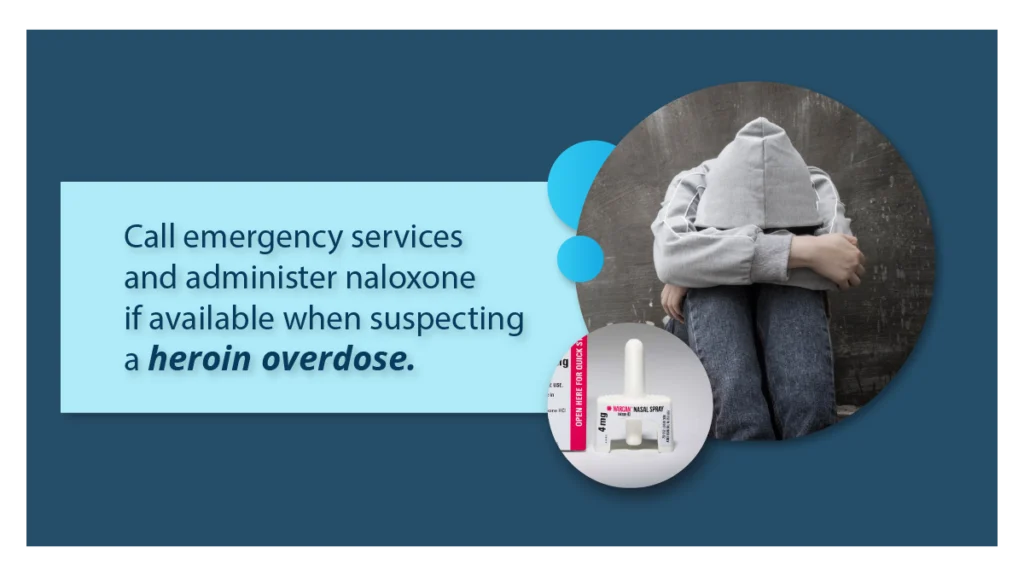Heroin overdose is a critical medical emergency characterized by the excessive consumption of this potent opioid drug, leading to life-threatening complications.
From slowed breathing and blue lips to confusion and pinpoint pupils, understanding heroin overdose symptoms is pivotal in addressing the urgent nature of heroin overdose emergencies.
Key Takeaways
Individuals who are dependent on heroin may experience withdrawal symptoms when they attempt to quit or reduce their use. Here’s what you need to know:
- Heroin is a potent opioid drug derived from morphine that carries a high risk of addiction and overdose.
- Blue lips, shallow breaths, and extreme drowsiness are telltale signs of a heroin overdose.
- Call emergency services and administer naloxone if available when suspecting a heroin overdose.
Contact The Haven Detox-Little Rock at (501) 271-3342 for more information and personalized drug recovery assistance to live a healthier and happier life.
What Is Heroin?
Heroin is a highly addictive opioid drug derived from morphine, a natural substance extracted from the seed pod of the opium poppy plant. It is commonly sold as a white or brown powder or a black sticky substance known as “black tar heroin.”
Heroin is typically smoked, snorted, or injected, leading to a rapid and intense euphoria. However, its use poses severe health risks, including respiratory failure, overdose, and long-term dependence.
Due to its potent addictive nature, heroin abuse is a major public health concern worldwide, contributing to numerous social and health-related issues.
Heroin Overdose Symptoms
Heroin overdose and addiction can have severe and life-threatening consequences. If you suspect someone may be experiencing a heroin overdose, call emergency services immediately.
Here are some common symptoms of a heroin overdose:
Physical Symptoms
- Shallow or Slow Breathing: Heroin can depress the respiratory system, leading to breathing difficulties or even respiratory failure.
- Blue or Purple Lips and Fingernails (Cyanosis): Lack of oxygen can cause the skin and lips to turn bluish or purple.
- Constricted Pupils: Much heroin use often results in pinpoint or extremely small pupils.
- Weak Pulse: A weak or erratic pulse may indicate cardiovascular distress.
- Extreme Drowsiness or Inability to Stay Awake: Individuals may have difficulty rousing or falling unconscious.
- Clammy Skin: The skin may feel cool and clammy.
- Vomiting: Nausea and vomiting can occur, increasing the risk of choking.
Mental Symptoms
- Confusion: The person may be disoriented or have difficulty understanding what is happening.
- Unresponsiveness: Individuals may be unresponsive to stimuli, such as loud noises or attempts to wake them.
- Loss of Consciousness: A heroin overdose can lead to a loss of consciousness, sometimes resulting in a coma.
- Slurred Speech: Speech may be slow, slurred, or difficult to understand.
- Inability to Focus: The person may be unable to concentrate or respond to their surroundings.
It’s important to note that the severity and combination of symptoms can vary. If you suspect someone is experiencing a heroin overdose, call emergency services immediately.
Heroin Overdose Risks and Side Effects
Heroin poses severe risks and side effects, especially in the event of an overdose. Understanding the specific impacts on the nervous system, respiratory system, and heart is crucial for grasping the gravity of heroin abuse.
Effects on the Nervous System
Heroin exerts its primary effects on the nervous system, binding to opioid receptors in the brain. This binding results in a surge of pleasure and euphoria and depresses vital functions. Overdosing intensifies these effects, leading to profound sedation, confusion, and, in extreme cases, coma.
The nervous system, overwhelmed by the opioid’s influence, struggles to maintain essential functions, heightening the risk of a life-threatening overdose.
Damage to the Respiratory System
Heroin overdose poses a significant threat to the respiratory system. The drug suppresses the brain’s respiratory centers, slowing breathing to dangerous levels. In an overdose scenario, this respiratory depression becomes severe, causing hypoxia or a lack of oxygen in the body.
The consequences can be dire, ranging from respiratory failure to irreversible brain damage, underscoring the critical importance of prompt medical intervention.
Impact on the Heart
Heroin abuse takes a toll on the cardiovascular system, and an overdose amplifies these risks. The drug’s depressive effects extend to the heart, slowing its rate and diminishing its ability to pump blood effectively.
This cardiovascular strain, coupled with other complications like low blood pressure, may lead to cardiac arrest, a dire consequence of heroin overdose that demands immediate medical attention.
Recognizing and addressing these specific risks are essential in combating the alarming consequences of heroin abuse.
Responding to Heroin Overdose

Responding to a heroin overdose requires quick and appropriate action to prevent a potentially fatal outcome.
If you suspect someone is showing signs of opioid overdose, follow these steps:
Actions to Take
When faced with a heroin overdose, swift and precise actions are critical. Begin by assessing the individual’s responsiveness and breathing. If unresponsive, call emergency services immediately to avoid withdrawal symptoms. Initiate CPR if necessary and stay with the person until help arrives.
Time is of the essence, and quick intervention can be life-saving.
Administering Naloxone
Naloxone, an opioid receptor antagonist, is a key tool in reversing the effects of a heroin overdose. If available, administer naloxone as directed on the packaging. Prioritize intramuscular injection in the thigh for faster absorption.
Remember, seeking professional medical care is crucial even after administering naloxone medication, as its effects are temporary, and the individual may require additional care.
Role of Medical Professional
Medical professionals play a pivotal role in responding to synthetic opioid overdoses. Upon arrival, they assess the patient’s condition, provide advanced life support, and continue administering naloxone as needed.
Stabilizing vital signs and addressing respiratory issues are paramount. Additionally, healthcare providers offer valuable guidance to family and friends on post-overdose care, treatment options, and prevention strategies.
Collaboration with addiction specialists ensures a comprehensive approach to addressing the underlying issues contributing to substance abuse.
Heroin Overdose Prevention
Overdosing on heroin can be life-threatening, but some measures and interventions can help prevent fatal outcomes.
Here are some key points to consider for drug use prevention:
Drug Abuse and Overdose Education
Effective heroin overdose prevention begins with comprehensive drug abuse and overdose education. Communities must prioritize awareness campaigns to inform individuals about the risks associated with heroin use, the signs of overdose and tolerance, and the importance of seeking help.
Educational programs should target both users and their support networks to foster a better understanding of the dangers involved.
How Treatment Can Help
Timely and accessible treatment plays a pivotal role in preventing heroin overdoses. Rehabilitation services should emphasize evidence-based approaches, offering medical and psychological support to patients struggling with heroin addiction.
Medication-assisted treatment(MAT), counseling, therapies, and support groups contribute to a holistic approach, addressing both the physical and psychological aspects of addiction. Encouraging individuals or teens to seek help without fear of judgment is crucial for effective prevention.
Community and National Prevention Strategies
Community and national prevention strategies are crucial in addressing the heroin overdose crisis. At the community level, it is imperative to establish harm reduction initiatives, such as distributing naloxone kits to first responders and community members.
These initiatives help combat the immediate effects of opioid overdoses. Additionally, community-based efforts should focus on destigmatizing opioid use disorder and increasing awareness about prescription opioid risks.
On a national scale, there should be a concentrated effort toward policy reforms prioritizing addiction treatment over punitive measures. By shifting the focus from punishment to rehabilitation, we can better address the root causes of opioid use disorders.
National strategies should also aim to reduce the stigma surrounding opioid addiction, encouraging individuals to seek help without fear of judgment.
Frequently Asked Questions (FAQ)
What are the common signs of a heroin overdose?
Signs of a heroin overdose include slowed or stopped breathing, pinpoint pupils, blue or purple lips and nails, weak pulse, extreme drowsiness, and unconsciousness. If you suspect a drug overdose, seek emergency medical help from doctors immediately.
Naloxone can reverse heroin’s effects, but professional assistance is crucial for a comprehensive response.
How quickly do symptoms of a heroin overdose manifest?
Heroin overdose symptoms can manifest rapidly, typically within minutes to hours after use. Signs include slowed breathing, runny nose, pinpoint pupils, and loss of consciousness. Prompt emergency medical intervention is vital, as delays can result in even death.
In addition, naloxone, when administered promptly, can reverse the overdose effects of substance use and related problems, highlighting the importance of swift response to save lives.
How can I help someone who is showing signs of a heroin overdose?
Call emergency services immediately. Check for signs of breathing and administer naloxone if available. Perform rescue breathing if necessary. Stay with the person until help arrives. Please don’t leave them alone. Time is crucial; prompt action can save a life.
Commit to Change with The Haven Detox-Little Rock
Take the first step towards a life free from heroin at The Haven Detox-Little Rock.
Our detox program cleanses your body of toxins, providing a crucial starting point for your recovery journey. For a holistic approach, our residential treatment program ensures sustained support, fostering long-term recovery.
Furthermore, our dedicated therapists guide you through treatment and empower you with prevention methods, equipping you for a resilient tomorrow.Your transformation begins here. Contact us at (501) 271-3342 for more information.





